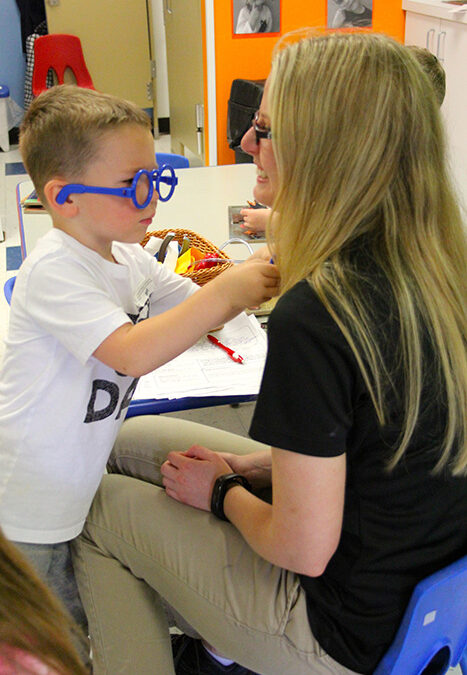At Celebree School, we advocate for Conscious Discipline, practicing it in our classrooms and programs. In this series, our educators explain why Conscious Discipline often works when traditional discipline does not, and to provide parents with a comprehensive set of best practices for implementing Conscious Discipline in their own lives.
What is Conscious Discipline?
Created by Dr. Becky Bailey, an internationally renowned expert in child developmental psychology, Conscious Discipline is built on the premise of developing discipline within children rather than applying discipline to them. It is a process that helps children to identify helpful behavior and collaborate with their parents and educators to develop solutions for transforming hurtful behavior into helpful behavior. But, in order for caregivers and educators to effectively implement this discipline philosophy, it is important to first understand why Conscious Discipline is a more effective and appropriate disciplinary tool than other traditional methods.
Reason One: Punishment and Verbal Abuse Can Have Lasting Psychological and Emotional Effects
Children want to love and trust their parents and the other adults in their life; however, this trust is eroded by the use of physical punishment and verbal abuse. According to Bernadette Saunders, a Senior Lecturer in the Faculty of Medicine, Nursing and Health Sciences at Monash University, “Children commonly tell us that physical punishment hurts them physically and can escalate in severity; arouses negative emotions, such as resentment, confusion, sadness, hatred, humiliation, and anger; creates fear and impedes learning; is not constructive, children prefer reasoning; and it perpetuates violence as a means of resolving conflict.” After being physically punished or verbally attacked, children feel unlovable and untrusting of the adults in their lives, which impedes positive relationships and their ability to comply with expectations.
Furthermore, a meta-analysis of studies performed to determine the effects of physical punishment—specifically spanking—showed that “spanking was associated with 13 out of a total of 17 negative outcomes [the analysis] assessed, including increased aggression and behavioral and mental health problems as well as reduced cognitive ability and self-esteem.” Studies have also shown that children who are spanked or hit as punishment are more likely to hit others, including friends, peers and adults, especially if they are being punished for antisocial behavior.
Conscious Discipline, on the other hand, is a set of principles founded on the love and nurturing of children. It allows children to express themselves in a safe and trusted environment, while working to reason through the decisions they make. Conscious Discipline requires no physical force, coercion or harsh language to encourage appropriate behavior, instead using consciousness, understanding, logic, reasoning, problem-solving and empathy.
Reason Two: Punishment is Not Effective at Correcting and Changing Behavior in the Long-Term
Physical punishment is not only damaging to children, but it is also an ineffective means of discipline. While physical punishment may create a compliant child in the short term, it does nothing to reduce hurtful behavior, or promote helpful behavior, in the long term. Studies have shown that punishment does not encourage individuals to engage in helpful behavior; rather, it only encourages an avoidance of punishment. In this way, children wait to engage in hurtful behavior when parents or educators are not available to discipline them, instead of consciously and proactively choosing to engage in helpful behavior.
Conscious Discipline works with the developmental stages of children to ensure they can understand and exhibit helpful behaviors in the long term. It uses a child’s natural desire to please their parents in a way that teaches them why certain behaviors are helpful or hurtful. Instead of acting as a quick fix or temporary measure, Conscious Discipline is a daily process that helps children discipline themselves, instead of relying on a series of punishments and rewards to encourage or discourage behavior.
Reason Three: Punishing Children Does Not Increase Their Ability to Internally Differentiate Between Helpful and Hurtful Behavior
Punishment does not instill values in children or help them to internally differentiate between helpful and hurtful behavior—rather, it teaches children that certain behaviors are wrong only because they will be punished for performing them, and that helpful behaviors are only right because punishment is not administered. While more mild punishments, such as time outs or the removal of privileges, may seem like an effective means of creating helpful behavior in children, without resorting to physical violence, these punishments do not instill a sense of right and wrong in children.
Children must be told why a behavior is inherently helpful and hurtful—not because their parent or educator said so, or because they are being rewarded or punished for it, but because of the actual negative or positive consequences it will have on themselves and others. Conscious Discipline uses this method to help children internally regulate themselves and exhibit helpful behaviors. Children are capable of logic and reasoning as early as two or three years old, and most children will be able to understand why a certain behavior is helpful or hurtful if the concept is explained to them, repeated regularly and reinforced by modeling the helpful behavior.
We Want to Start a Conscious Discipline Revolution—With Your Help!
Punishing children is a reactive, and not proactive, solution to disciplining children. While punishing children is damaging, ineffective and unable to be used to instill values in children, Conscious Discipline is nurturing, value-building and able to help children regulate and modify their own behavior. Check out part two of our Conscious Discipline series to learn how to implement Conscious Discipline principles in your everyday routine. For more information about how Celebree School educators use Conscious Discipline within the classroom, contact us today!

